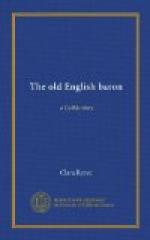“Make haste, John,” said the father, “and be sure you say neither more nor less than what I have told you.”
“I will, father,” said the lad; and immediately set off, ran like a buck across the fields, and was out of sight in an instant.
“I hope, friend,” said Sir Philip, “you have not sent your son to provide for my entertainment; I am a soldier, used to lodge and fare hard; and, if it were otherwise, your courtesy and kindness would give a relish to the most ordinary food.”
“I wish heartily,” said Wyatt, “it was in my power to entertain your honour as you ought to be; but, as I cannot do so, I will, when my son returns, acquaint you with the errand I sent him on.”
After this they conversed together on common subjects, like fellow-creatures of the same natural form and endowments, though different kinds of education had given a conscious superiority to the one, a conscious inferiority to the other; and the due respect was paid by the latter, without being exacted by the former. In about half an hour young John returned.
“Thou hast made haste,” said the father.
“Not more than good speed,” quoth the son.
“Tell us, then, how you speed?”
“Shall I tell all that passed?” said John.
“All,” said the father; “I don’t want to hide any thing.”
John stood with his cap in his hand, and thus told his tale—
“I went straight to the castle as fast as I could run; it was my hap to light on young Master Edmund first, so I told him just as you bad me, that a noble gentleman was come a long journey from foreign parts to see the Lord Lovel, his friend; and, having lived abroad many years, he did not know that he was dead, and that the castle was fallen into other hands; that upon hearing these tidings he was much grieved and disappointed, and wanting a night’s lodging, to rest himself before he returned to his own home, he was fain to take up with one at our cottage; that my father thought my Lord would be angry with him, if he were not told of the stranger’s journey and intentions, especially to let such a man lie at our cottage, where he could neither be lodged nor entertained according to his quality.”
Here John stopped, and his father exclaimed—
“A good lad! you did your errand very well; and tell us the answer.”
John proceeded—
“Master Edmund ordered me some beer, and went to acquaint my Lord of the message; he stayed a while, and then came back to me.— ‘John,’ said he, ’tell the noble stranger that the Baron Fitz-Owen greets him well, and desires him to rest assured, that though Lord Lovel is dead, and the castle fallen into other hands, his friends will always find a welcome there; and my lord desires that he will accept of a lodging there, while he remains in this country.’ — So I came away directly, and made haste to deliver my errand.”
Sir Philip expressed some dissatisfaction at this mark of old Wyatt’s respect.




